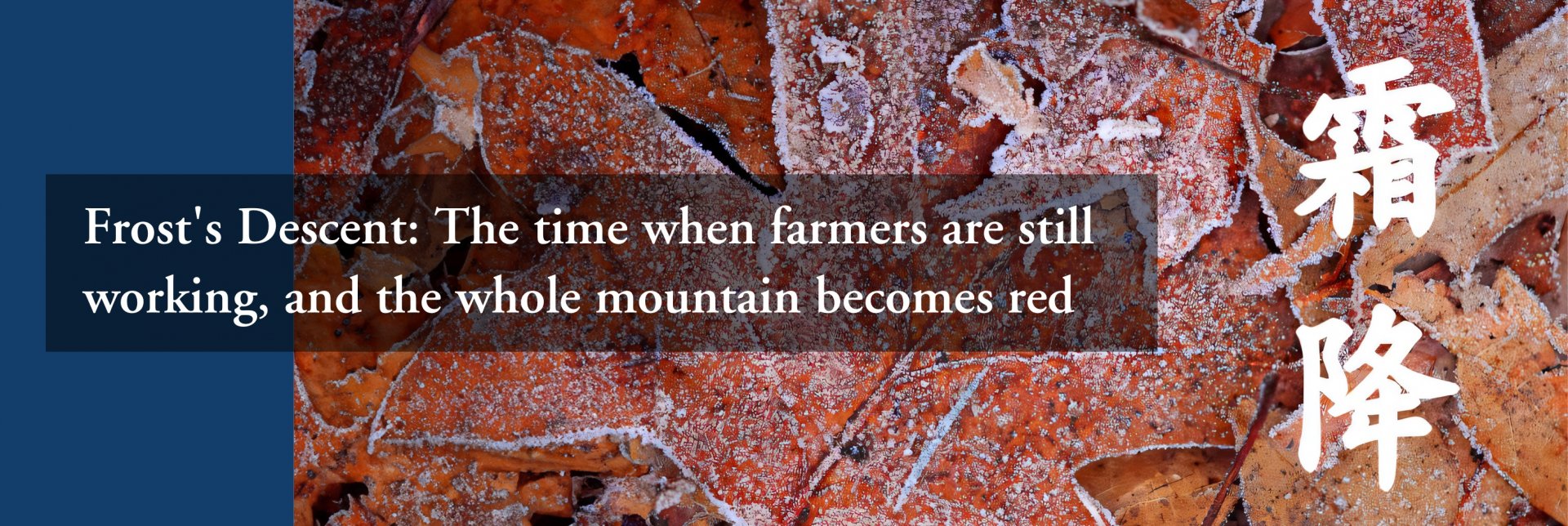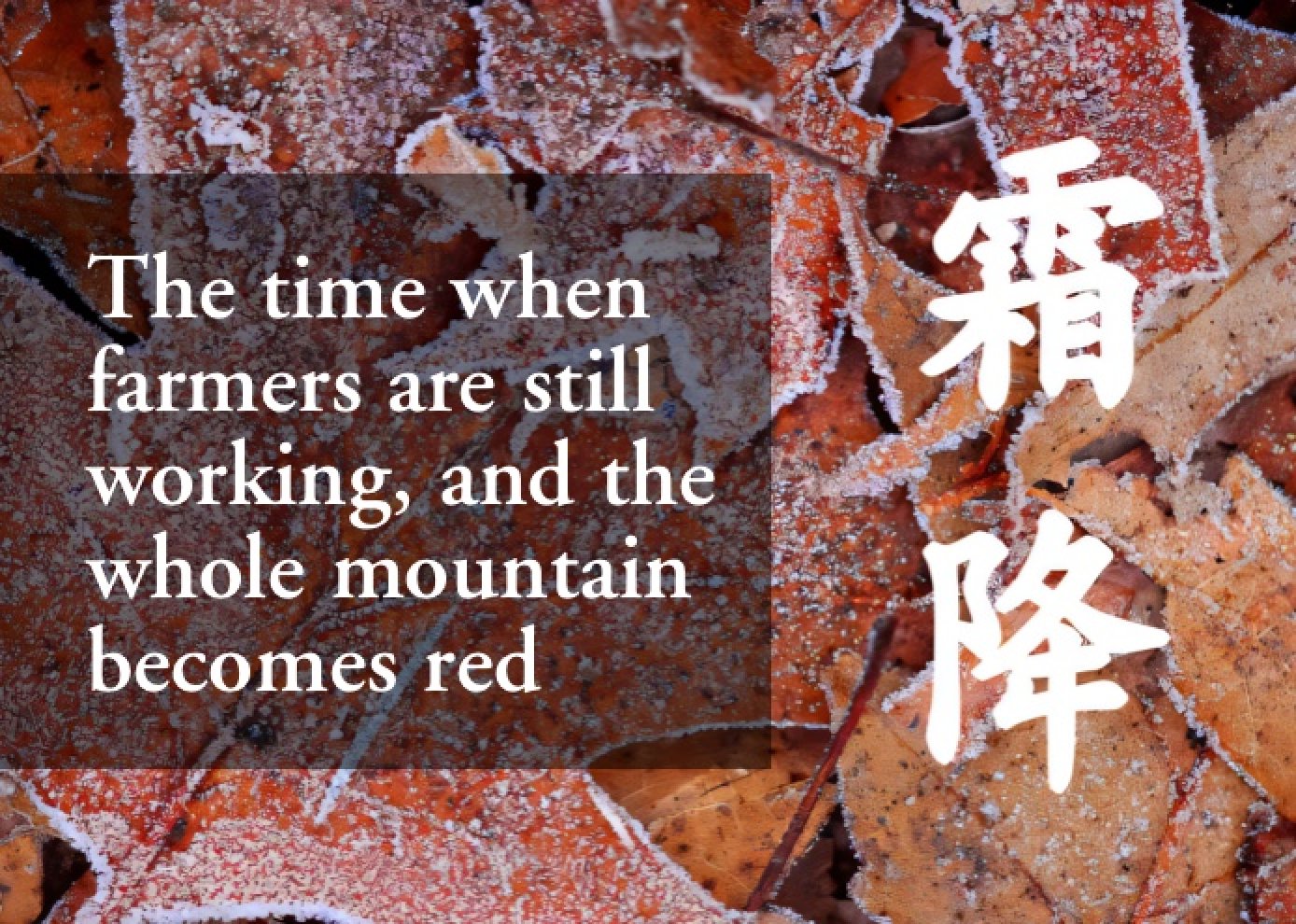Frost's Descent:
The time when farmers are still working, and the whole mountain becomes red
Water is the origin of life. Therefore, the symbol of water brings inspirations to ancient Chinese thoughts on life. For example, “the ultimate virtue is like water” (上善若水) said by Lao Tsz (老子, circa 571-471 BC) and “Time pass like water” (逝者如斯) said by Confucius (孔子, 551-479 BC) are well-known among Chinese families. Among the twenty-four solar terms, many of them derive from the concept of “water”. For example, in spring there are Rain Water (雨水), Grain Water (谷雨), in winter there are Lesser Snow (小雪) and Greater Snow (大雪), yet most of the water-related terms occur in autumn: White Dew (白露), Cold Dew (寒露) and Frost’s Descent (霜降) (translator’s note: all translations of solar terms are based on Chinese Meterological Administration’s translation). If we differentiate rigorously, we could find that rain in the spring and snow in the winter all fall from the sky, on the other hand, dew and frost in the autumn are formed by condensation of water evaporated from the earth. Therefore, Frost’s descent, as the last solar term in autumn, does not mean “frost fallen from the sky”. Instead, the “descent” (Chinese character Jiang 降) refers to the falling temperature. This indicates that in this solar term, cold current from the North is becoming more frequent and much stronger. Thus, the temperature difference between daytime and nighttime is even bigger while the temperature during daytime and nighttime is even much lower (Jiang). Therefore, cold dew, which is “going to froze” at the solar term of Cold Dew (寒露), is now completely frozen into white frost. This is described in a famous quote in the Book of Odes (詩經), “Green, green the reed, Dew and frost gleam.” (蒹葭蒼蒼,白露為霜) (trans. James Legge). Although this could refer to autumn scenery in general, this quote may be even more appropriate to describe the scenery in the late autumn in this solar term.

Ancient Chinese writers and poets usually adopt autumn frost in their works to describe the feeling of mournfulness and sadness. For example, the poem White Dews Become Frost (白露為霜) written by Yan Can (顔粲, ?-?) in Tang Dynasty says, “I am sad as the autumn indicates the end of the year, and prosperous dews now turn into frost (悲秋歲將晚,繁露已成霜)”. Another example is Morning Walk in Shang Mountain (〈商山早行〉) by Wen Tingyun (溫庭筠, circa 812-circa 866), which says “Rooster crowing in the bungalow under the moonlight, people are walking on the bridge that is covered with frost (雞聲茅店月,人跡板橋霜)”. Even in the massively popular poem by Zhang Ji (張繼, circa 715-circa 779) titled “Night visit at the Bridge of Maples” (〈楓橋夜泊〉), the aura of sadness is evident: “The moon is sunk when birds are chirping in the sky full of frost. Among the maple tree along the river, sadness accompanies my sleep along with the scanty lamplights from fisherman’s ships.” (月落烏啼霜滿天,江楓漁火對愁眠). Of course, there are exceptions. For example, romantic and vibrant poet Du Mu (杜牧, 803-852) took a special perspective in his poem A walk in the mountain (〈山行〉). He found that even in the world that was covered with frost, there was still warmth in this scenery: “Inside the clouds there are families (白雲深處有人家)”, “the leaves, even covered with frosts, are even more red than flowers in the second month”. (霜葉紅於二月花). It is notable that there is also a genre of poem that describes the agricultural aspects in relation to frost. For example, in the second poem of suite poems Return to the farm in the countryside (〈歸田園居〉) written by Tao Yuanming (365-427), it says, “I am so afraid of the coming of frost, which will make my crops as scanty as grasses (常恐霜霰至,零落同草莽)”. Tao Yuanming is a famous pastoral poet that had hands-on experience in farming. Therefore, in the late autumn, he often feared that the frost would come earlier than expected and destroy his crops.
Nie Yizhong (聶夷中, 837-circa 884) in the late Tang Dynasty is another poet that cared about the hardship of farmers. His work For farmers (author’s note: some acknowledge this poem as written by Meng Jiao 孟郊) to encourage farmers to work hard in farming, in particular in the critical period of spring. To emphasize this message, he made a contrast to the late autumn scenery: “When frost is fallen, all grasses are no longer green. When the strong wind sweeps across the forest, all leaves cease to attach to the branches (清霜一委地,萬草色不綠;狂風一飄林,萬葉不著木)”. When frost is everywhere and woods are withering, the depressing scenario of the fall of the year is becoming obvious, which often indicates the lack of food and clothing, as said in Tao Yuanming (陶淵明, 365-427)’s poem Adage for farmers (〈勸農〉), “if you can’t keep storing food and cotton, you must suffer from starving and freezing (擔石不儲,饑寒交至).” At that moment, it would be too late to regret.

For agricultural society in Ancient China, it is of ultimate importance to implement the farming plan in spring. Nonetheless, even in between the late autumn and the solar term of Frost’s Descent, farmers did not have time for a rest as they were still busy with farm work. As early as in Book of Odes (《詩經》), there are many poems to remind farmers to work throughout the year. For example, The Cricket (〈蟋蟀〉). In that poem, the author described a cricket which came to the hall of the house from the countryside under the cold weather. It is the time when in another poem The Seventh Month (〈七月〉) described that the cricket “comes to the household during the ninth month (九月在戶)”, which is close to the time of late autumn during the solar term of Frost’s Descent. This makes one think about the end of the year, therefore one should remind oneself not to be indulged in playing (好樂無荒) but should always think about one’s responsibility (職思其居), endeavouring to achieve excellence.
In Yuan Dynasty, Wang Zhen (王禎, 1271-1368) created the Calendar of Agriculture (〈授時圖〉) that enlisted the necessary farm work associated with the twenty-four solar terms. During the Cold Dew and Frost’s Descent, he reminded farmers to work on the following items: “cultivating the land for linens (耕麻地), planting the rapeseed plants (種油菜), harvesting the beans (刈大豆), choosing good seeds of crops (選五殼子), harvesting sesame, corns and chestnuts (收芝麻, 栗芋), harvesting the seeds of Camellia (收茶子), sewing clothes (授衣), pickling gingers with red yeast (糟姜), storing leaves (藏葉), collecting chrysanthemum (採菊), building the garden (築場圃), and constructing the storage cellar (修竇窖).” During this time, the farm work in the North is coming to an end, while in the South farmers are still very busy with harvesting for lately ripe crops, and other work like planting seeds for rapeseed plants. The poem titled Harvest of upland rice in the Western field in the mid ninth month in the year of Gengxu (庚戌歲九月中於西田穫旱稻) written by Tao Yuanming was the description of his busy work in the farm, “at the sun rise I go out to put my humble effort, at the sun down I come back with the crops (晨出肆微勤,日入負禾還)”. He also mentioned the bitterness during the Frost’s Descent, “The mountain is full of dew and frost, the air and the wind are also cold (山中饒霜露,風氣亦先寒)”. Even in the modern times when there are advancements in agricultural technology, farmers still manage their farms wholeheartedly with reference to the schedule of the nature as represented in this motto: “The frost’s descent is the time to harvest the beans, break the crust of the crops, and keep them in the store immediately. Farm the late ripe wheat and take time to sow seeds. Cut the grasses in the mountain so as to feed the livestock (寒露霜降,收割大豆。抓緊打場,及時入庫。晚茬小麥,突擊播種。收割山草,好餵牲口)”.

The arrival of the Frost’s Descent, which marks the end of “the three solar terms in the autumn” (三秋), was regarded as an important moment in ancient China. There are various cultural activities concerning this solar term, most of which reflect local specialties. For example, Coming to the western side to receive frost (西郊迎霜), Eating persimmons (吃杮子), Chrysanthemum appreciation parties (菊花會), Driving away the ghost of taro (translators note; 送芋鬼, which is a practice that children roast taro on a roofing tile and throw away the tile after eating the taro) as well as Eating mutton pot (煲羊肉), to name a few. A remarkable event is the “Frost’s Descent Festival” (霜降節), which is a popular festival in part of Guangxi Province and in northern Vietnam. The Zhuang People’s Frost’s Descent Festival (壯族霜降節), which is held in Tiandeng County of Chongzuo city (崇左市,天等縣), is having the longest history among them and is successfully enlisted as National intangible cultural heritage in 2016. According to media report, the festival lasted for nine days, with a rich repertoire including worshipping, community singing (歌圩), demonstrations of specific cultural rituals, and sports events. The most important among all was the ceremony to worship their gods and commemorating their heroes in their history as well as celebrating the good harvest.

At this moment, many thoughts and reflections also pop up to my mind. The end of the autumn is very cold for sure, life is also inevitably full of hardship, yet there are also many things that give warmth to our hearts. Even at the time when frost is covering various trees, we can still find the leaves as red as fire and numerous chrysanthemum flowers blossom as gold. Therefore, I would like to adopt a line from Su Shi (蘇軾, 1037-1101) ’s poem titled Dedicated to Liu Jingwen (〈贈劉景文〉), which is an ode to the late autumn, to conclude this article: “you should remember the year’s good moments, when the scenery that oranges are in its fullest yellow and tangerines are in its fullest green (一年好景君須記,最是橙黃橘綠時)”.

Reference
Book
1. 程俊英、蔣見元著:《詩經註析》(北京:中華書局,1991年),頁306,344,406。
2. 陶淵明著,逯欽立校註:《陶淵明集》(北京:中華書局,1979年),頁25,84。
Journal Article
1. 丁建川:〈《王禎農書·授時圖》與二十四節氣〉,《中國農史》,第3期(2018年),頁132。
2. 黃幼霞:〈天等縣「霜降節文化保護與發展座談會」綜述〉,《歌海》,第1 期(2018年),頁125-126。
All articles/videos are prohibited from reproducing without the permission of the copyright holder.




Welcome to leave a message:
Please Sign In/Sign Up as a member and leave a message